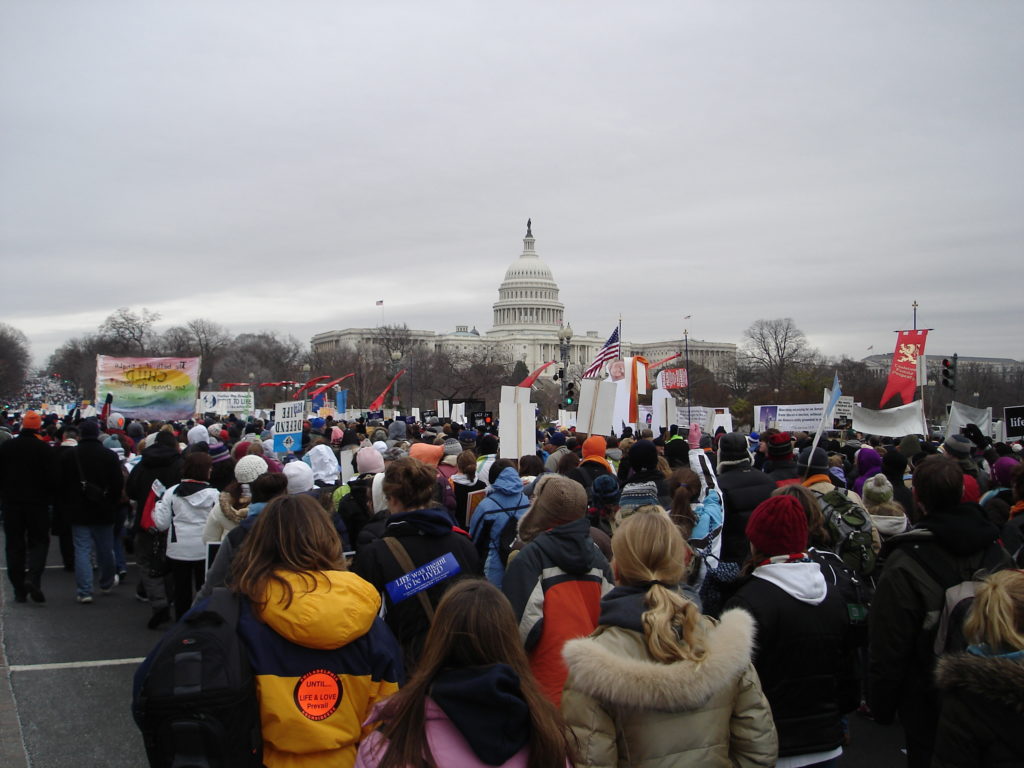
Jonathan Mitchell, the key architect of the Texas Fetal Heartbeat law (SB8), released a statement detailing the argument for the law. “The political branches have been too willing to cede control of constitutional interpretation to the federal judiciary,” he said. “But there are ways to counter the judiciary’s constitutional pronouncements…” His argument echoed the case that Hadley Arkes has been making for years now. We republish this piece from last year where Prof. Arkes lays out the foundations of this argument.
As we reached the 47th anniversary of Roe v. Wade, pro-lifers gathered again in the March for Life, in what is usually the coldest weather that Washington D.C. will suffer. The March began with speeches on the Mall and then it would move, en masse, down Constitution Avenue until it culminated at the Supreme Court, the scene of the crime.
In January 1973, seven judges had taken upon themselves to sweep away, in a stroke, the laws in all of the States and the District of Columbia that cast protections over the life of a child in the womb. And now, the pro-lifers head to the Court with the sense of seeking redress for the wrong that emanated from that place, transforming the culture as well as the laws.
They go with a livelier hope that the Court, as it is now constituted, is closer to the moment when Roe v. Wade may be overruled, or at least scaled back, in a decisive move that would lead, step by step, to its withering away.
In my last column, I recalled the classic example of the political branches, led by Lincoln, countering the decision of the Supreme Court in the Dred Scott case, the decision that threatened to sweep away all laws that barred slavery. As I sought to show, Lincoln’s argument for the constitutional role of the political branches was anchored in the very logic of the separation of powers under the Constitution.
Over the last twenty years some of us have sought to make Lincoln’s understanding explicit as part of the preamble, or understanding, attached to pro-life legislation. That effort failed, for various reasons until 2002 when we succeeded in passing the Born-Alive Infants’ Protection Act, the Act that sought to protect children who had survived abortions.
And now some of us have sought to raise the issue again with the sequel, the bill that seeks to attach serious penalties for the surgeons who kill those babies surviving abortion. If the political class had been clear on this understanding in the run-up to Roe v. Wade, there would have been no need for pro-lifers to be marching in the cold every January.
The argument begins by returning to the classic case of Cohens v. Virginia (1822). Chief Justice John Marshall observed there that any question arising under the Constitution and laws of the United States may rightly come within the reach of the judicial branch of the federal government.
But if that were the case, we suggested that the corollary clearly followed:
If the Supreme Court can articulate new “rights” under the Constitution, the legislative branch must be able to vindicate the same rights under the same Clause in the Constitution where the Court claims to have found them. And in filling out those rights, the Congress, at the same time, may mark their limits. The one thing that should not be tenable under this Constitution is that the Court may articulate new rights – and then assign to itself a monopoly of the legislative power in shaping those rights.
With the benign logic of the separation of powers, it would have made the most profound difference if Justice Brennan and his colleagues had understood, at the very outset, that if they loosed upon this country this new “right to abortion,” the judges could not keep control of it. Congress would have laid hands on it at once, and we know, from the record, what Congress was likely to have done.
Lest we forget, the parties were not as polarized as they are now on this question. There were strong pro-life Democrats in Congress, reflecting the outrage of their voters, and quite ready to do something. If Congress laid its hands on this matter, it would have been to counter forcefully the decision in Roe, not to endorse and promote it as a breakthrough in our jurisprudence.
Justice William Brennan was no mean reader of the political winds, and with this cast of things, it seems highly unlikely that he would have encouraged his colleagues to spring this decision, especially with two judges in bristling dissent.
In that event we would have been spared the scene of pro-lifers marching every year in the cold, winding around the Capitol until they reached the Court – and with that move confirming a premise even worse yet: that, among the branches of our government, the Court is truly the most sovereign of all in governing our lives.
What I am suggesting is that the simple logic of the separation of powers – the logic explained by Lincoln and exemplified by his Administration – that this logic of the Constitution could have been enough to have spared us the decision that disfigured our laws and altered the moral sensibilities of our people.
If and when Roe v. Wade is overturned, it would be on a day in June, when the Court announces its decisions on the cases most freighted with controversy. In that event, the pro-life March of celebration could be held in the spring, with the signs of life renewing.
And yet my sense of the pro-lifers is that they would still march every January in the cold. For something in them just doesn’t want to make things easy. They might prefer to remember with cold sobriety that the temptation to do thoughtless, even murderous things, may spring even from decent people living in good places.
This piece was originally published in The Catholic Thing on January 28, 2020.


